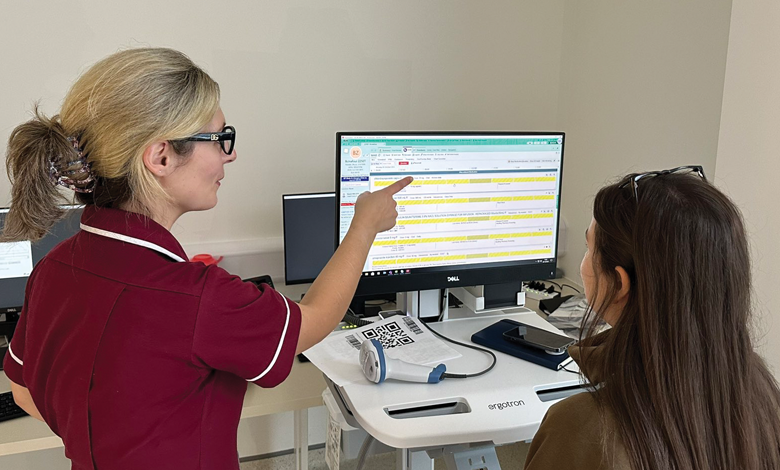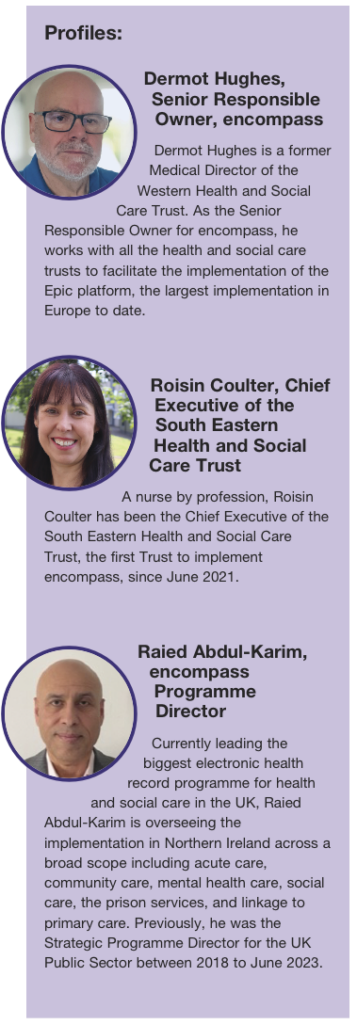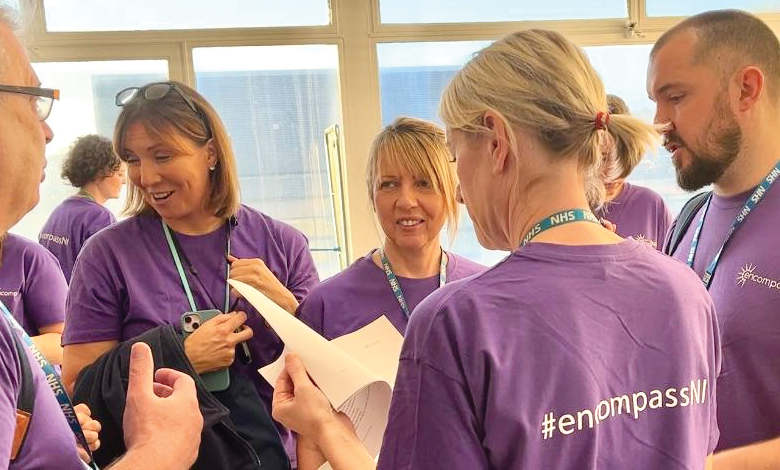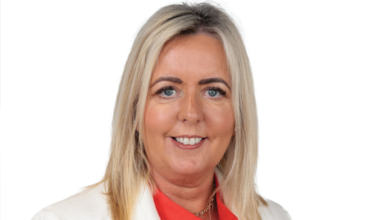encompass: Transforming healthcare

Following the launch of a new regional digital patient record system in Northern Ireland by the South Eastern Health and Social Care Trust on 9 November 2023, David Whelan talks to key stakeholders about the rollout of ‘encompass’ and its transformational capabilities.
By the end of 2025, it is intended that all of Northern Ireland’s health and social care trusts will have implemented the new digital patient record system, encompass.
The creation of a digital care record for every citizen in Northern Ireland has been described as the greatest transformational change to the health and social care system in a generation.
In November 2023, the South Eastern Health and Social Care Trust marked a significant milestone by becoming the first trust to ‘Go-Live’ with the transformative system, a culmination of over seven years of work.
The system itself, while unique to Northern Ireland, was created by Epic, a global leader in the delivery of electronic health record software, which currently provides for over 200 million people within the UK and across the globe.
As well as replacing existing disjointed and outdated IT systems, ensuring more efficient and effective information access and storage for health and social care professionals, a My Care patient portal has been developed, which will allow everyone in Northern Ireland to access their own patient records.
Discussing the early implementation of encompass, Chief Executive of the South Eastern Health and Social Care Trust, Roisin Coulter, praised the ambitious approach to tailoring a world-leading system which is in use in over 19 countries across the world adding that benefits are already being realised.
“Every person in Northern Ireland will benefit from having one single, lifetime electronic health record. The encompass programme has, to date, helped us integrate over 40 systems within one record, which offers a sense of the ambition behind this transformation. For patients, there are multiple benefits to their interactions with health and social care services being consolidated and accessible in one place, and for practitioners, there are tremendous advantages to reducing variation and delivering a more consistent practice.”
Raied Abdul-Karim, encompass Programme Director, who has overseen the introduction of electronic health records in many parts of the UK, says that the successful launch of the programme was aided by the South Eastern Health and Social Care Trust acting as a champion for transformation.
“Understandably, there were anxieties and concerns around delivering such a large programme of transformation because, by its very nature, it is disruptive.
“Roisin [Coulter] was a visible leader and the buy-in from her team ensured a smooth and safe implementation, which is critical to gaining the confidence and trust of all other organisations as we continue the rollout of encompass. I think it is important to say that no transformation of this scale will run perfectly, and so we must ensure that any issues that arise are treated as learning, to ensure the next implementation is even better.”
At a time when resources are tight across all public services, particularly in the health and social care sector, Senior Responsible Owner for encompass, Dermot Hughes, accepts that some risk is involved in the commitment to such a large-scale programme, but reiterates the necessity for change.
“I think it was recognised that the biggest risk existed in not delivering change. The legacy systems that existed prior to encompass were senescent and no longer fit for purpose.
“In terms of the launch of encompass, we identified the greatest risk as relating to changing work patterns, how staff interact with systems, and ultimately how patients experience their healthcare. To manage this risk, we have implemented strong governance, establishing a matrix of risk which both identifies and shares risks, which we work through to ensure we get to a point where all stakeholders are comfortable with the system before we ‘Go-Live’.
“The main focus of the ‘Go-Live’ process is not simply to turn on an IT system, but to turn on an IT system where patients are kept safe.”
To date, the South Eastern Trust has trained over 9,500 staff in encompass, deployed some 12,500 new devices and was supported by 700 additional ad hoc staff from across the globe during the ‘Go-Live’ process.
Evolution
Feedback from the Epic team suggests that some three months on from ‘Go-Live’, the Trust are ahead in their implementation in comparison to UK counterparts. However, as Abdul-Karim explains, implementation is only the beginning of the process.
“It is not unusual for such a major programme to take time to embed, especially as staff learn new ways of working and for the technology to mirror the care model. With every implementation, there is a stabilisation period, but success will be measured by benchmarking against other systems on how quickly people are using the system and whether the right benefits are being drawn.”
More importantly, explains Abdul-Karim, is the ability of the system to constantly evolve: “As new policies and care models evolve, tweaks and adjustments to the system will be required. This is a long journey, but it is a fruitful journey,” he says.
Cybersecurity
An overarching concern often raised with any digitisation of public services is around the cybersecurity threat. Health records, in particular, contain sensitive information, making it a prime target for ransomware. Abdul-Karim accepts that the impact of the risk profile is increased but is steadfast in his belief that safeguards have been successfully utilised to minimise threat. He believes that key to quelling concerns is raising awareness around the benefits and impact of the system to users and the wider public.
Underpinning this is an ambitious rollout of the My Care patient portal. To date, thousands of people have downloaded the My Care app with work underway to ensure patients can access their records and appointment details.
Hughes says: “Governance of the Epic systems across the world are well-known to be pre-eminently good, so any cyber risk is minimised and managed. From a user perspective, making information available and open to patients is a large culture change and gives those patients greater responsibility. Hopefully, that will alleviate some of the burden on primary care, but it also changes the dynamic completely, bringing us up to being the most digitally enabled population in western Europe in relation to health and social care.”
Coulter outlines the importance of patient and client involvement in the design of the patient portal. “We want to expand the use of the portal because we want to get to a place where citizens are empowered to take more responsibility for their health and wellbeing,” she explains.
“It can be a gamechanger for a region which faces significant challenges around chronic conditions, by supporting a two-way relationship between the citizen and the clinical, multi-professional team.
supporting a two-way relationship between the citizen and the clinical, multi-professional team.
“One month after the ‘Go-Live’ we had 12.7 million electronic messages sent through encompass, and we have administered over 185,000 electronic medication administrations. By expanding use, we can reduce variation, drive up standards, and improve safety.”
The Chief Executive will play a leading role in helping other trusts across Northern Ireland implement the system on a rolling basis, starting with Belfast Trust on 6 June 2024. She is quick to point out the broader benefits that will come from real-time information gathering and storage, especially when operational on a regional basis.
“As we plan and deliver services across Northern Ireland, real time information will link to the Department of Health and enable them to see what is happening in our health settings at any one time. In the past, we have relied on retrospective trends to plan, but this data will be a driver for delivery and importantly, for future planning.”
Hughes agrees that the encompass system has the potential to change healthcare management from “narrative to data” in a comprehensive and unique fashion. Concluding, he says: “The Epic platform is shared by hundreds of institutions around the world, including a dozen major institutions in the UK, and they act as your partner. Best practices and successes elsewhere are shared.
“Interestingly, it will also signal a quantum change for research and development in Northern Ireland, as data from birth to death will now be available to universities and their researchers.”
Northern Ireland’s unique model of care when compared to many global counterparts, encompassing social care, healthcare, mental health, and domiciliary care, for example, means that if successful, the digital transformation of healthcare will catapult the region to a global exemplar.
Abdul-Karim stresses the need for multi-stakeholder support as the rollout of encompass continues. “The scale of this programme is huge, and it is obvious to see from our work with the South Eastern Trust that this transformation reaches to everyone from doctors to nurses, caterers to cleaner, and patients in many settings. We need to celebrate the potential of this transformation, support it and trust that it will help deliver better and safer outcomes for all.”






